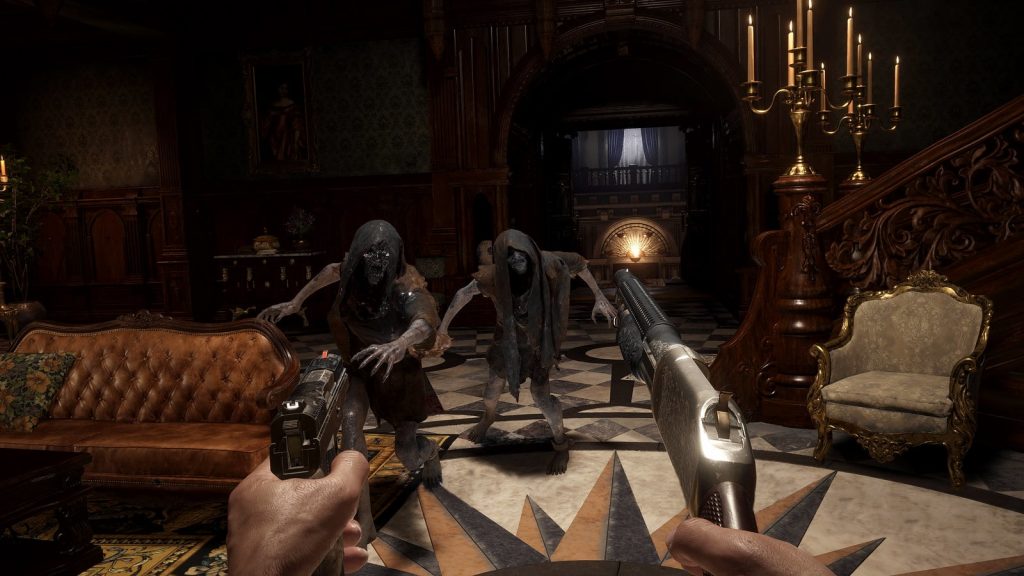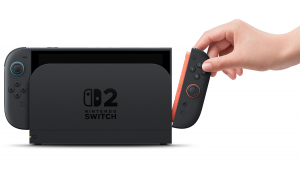Resident Evil 8 Village PSVR 2 Review: A Stunning & Engaging Horror Shooter


Originally released for consoles and PC in 2021, Resident Evil Village is one of PlayStation VR2’s major launch titles and an intense but wholly satisfying experience. Read on for our full Resident Evil Village PSVR 2 review.
At this point, the Resident Evil franchise is a staple of virtual reality ecosystems. On Quest, you can play a reimagined VR adaptation of Resident Evil 4 and soon, you’ll be able to play a remake of the same title on PSVR 2. However, the franchise’s VR journey began with Resident Evil 7: Biohazard in 2017, which included full VR support for the original PSVR headset on PS4. The entire campaign was playable in VR, albeit only with DualShock controller support and no motion controls.
The following installment, Resident Evil Village, was originally released for PC and consoles in 2021. In February 2023, Capcom released a new VR Mode for the game on PS5 that adds support for PlayStation VR2. While Village is still clearly a game designed for flatscreen platforms first, it’s nonetheless an absolute thrill to play on PSVR 2. Capcom strikes a balance that stays true to the original release while also appropriately adapting itself for virtual reality.
It Takes A Village…
Village is the second Resident Evil game based around first-person gameplay, which features frequent in-game ‘cutscenes’. These play out as scripted events where control is taken away from the player, as cinematic sequences play out while maintaining a first-person camera from Ethan’s perspective.
These scripted events are frequent and range in scope from small moments to huge spectacles. They can be as simple as Ethan pushing open a door or as complex as an enemy knocking you to the ground and pulling you across the gothic hallways of Castle Dimitrescu. These moments were clearly designed around flatscreen gameplay, so bringing them into VR is a challenge.

By default, all of the scripted events will play out in full immersive VR from Ethan’s point of view. This means that Ethan will move his hands, body and direction without input from the player, and can be knocked around or suddenly moved by enemies and changes in the environment.
In terms of comfort, it’s an intense proposition – especially for players prone to motion sickness in VR. Games that are designed first and foremost for VR will often go to lengths to avoid this kind of drastic artificial movement, but there would be no getting around it in Village without making huge changes to the entire experience. It’s a similar conundrum to the one in Resident Evil 4 on Quest and similarly, Village also gives you the option to display its frequent scripted events on a 2D screen for comfort.
While the 2D option is nice to have, the scripted events are some of the best and most dramatic parts of Resident Evil Village. If you can stomach it, it’s worth keeping the default immersive view on. It’s not always perfect – there are some frustrating bugs with how the game directs the player’s gaze and orientation – but it’s well worth it. Village will present you with some of the most mind-blowing, indescribable moments that make you feel completely part of its horrifying world.
Bringing A Bang To PSVR 2
Everything else about Village’s approach to VR is an absolute joy. After playing an hour or two on PS5 in 2021, I returned to the game properly on PSVR 2 last week and finished it completely blown away. There’s a level of detail and scale present that I haven’t experienced since Half-Life: Alyx. Every inch of Village’s design – from the environments to the sound to the gameplay itself – feels well considered and thought out.
Visually, Resident Evil Village is stunning. The details and fidelity present in the original flatscreen release mean that the game is immediately striking when brought to life on a VR headset. When compared to the visuals of most standalone VR releases of the last three years, it’s a stark and shocking leap (if also completely understandable, given that PS5 can drive multitudes more power than a mobile chipset).

It also helps that Village has a delicious art style that is dripping with atmosphere. Every corner of the game is unique and interesting to explore, with buildings that feel both grounded in real architectural design and completely fantastical at the same time. There is never a boring moment in Village, even when you’re just walking from one place to another.
The gameplay itself doesn’t disappoint either, making this the third Resident Evil port that feels at home in VR despite never being initially designed for the medium. Village’s pacing is a big factor in why it works so well in a headset. The campaign has an ebb and flow that expertly moves between exploration, high and low tension moments, environmental puzzles, thrilling combat and genuinely terrifying horror sequences.
Exploring the Village
As Ethan, you navigate the environment using stick-based artificial movement (there’s no teleport option) and pick up items with the grab or X button, with a flatscreen inventory menu that translates decently well to VR. A lot of your time is spent collecting items to craft into ammo, unlock new areas or sell to the Duke, the game’s merchant, in exchange for upgrades.
Village is easily one of the most cinematic VR shooters since Half-Life: Alyx. Not only does the game consistently look fantastic, but the weapons feel responsive and impactful to use. Every shot has weight and consequence, with fights gradually building pace in a way that feels perfectly suited for VR. The enemies in Village feel less like scripted robots and more like actual animals with distinct thought processes and patterns.
You’ll gradually unlock weapons across the campaign, which can be used in a retooled combat and item system designed for VR. All weapons must be manually reloaded and readied before shooting and they can be stored on your body – shotgun over your shoulder, sniper on your rear right side, pistol on your right hip and ammo on your left. Other items, such as pipe bombs, mines and your torch, are available on the inside of Ethan’s jacket. It’s a fantastic system that feels natural to use even in the heat of intense combat. It’s so satisfying to yank your shotgun out from over your shoulder or pull open your jacket to grab a pipe bomb.
The game punctuates combat with some of the most jaw-dropping, epic, scary and terrifying sequences you’ve ever seen in VR. Without delving into spoiler territory, some of the campaign’s biggest moments are a complete spectacle to witness inside a headset, showcasing a scale rarely seen in virtual reality releases.
A Fantastic Campaign On PSVR 2
The campaign length will vary depending on what difficulty you choose and whether you focus exclusively on the story or explore every nook and cranny for treasure. Playing on casual difficulty and sticking to the story, it took me just under seven hours, but I can easily see it taking upwards of 10 hours for those who want to explore or play on higher difficulties.
No matter what difficulty you choose, Village features a fantastic narrative-driven campaign that is the perfect blend of horror and action. This is VR horror done right, choosing to focus on terrifying monsters and bursts of high-tension moments over cheap and repetitive scares. It’s enough to make your skin crawl, but rarely so exhausting that you can’t take a bit more. Those who have played the game before can imagine just how frightening the basement sequence of House Beneviento becomes when played in VR.

Village is also a fantastic showcase of PSVR 2’s best features. The OLED screen with HDR makes a huge difference in a game like this, offering deep blacks that really enhance the tension and feeling of presence in low-lit scenes. The game also runs at 120Hz using PSVR 2’s 60FPS reprojection mode. While this can produce some minor blurriness at times, particularly when looking up close at moving character models, it’s largely forgettable and some might not even notice it.
The Sense controllers make good use of the haptics and adaptive triggers with variable resistance for guns. Likewise, headset haptics are used to great effect to convey epic moments or literally ground-shaking action. It all works in tandem with the fantastic sound design and 3D audio, which lets you pin the direction of an enemy before you even see them.
Resident Evil 8 Village – Final Verdict
Resident Evil 8 Village is a phenomenal launch title for PlayStation VR2. It’s a thrilling and immersive horror shooter with a campaign that reaches a scale of spectacle rarely seen in VR.
Despite the many clever adjustments made for the game’s transition to VR, there are nonetheless elements that remain distinctly flatscreen-first in their design. That might make it a hard sell for new players or those concerned about comfort, but even so, the Resident Evil franchise is clearly engaging when played in VR and Village is no exception.
The well-paced campaign and satisfying gunplay makes it easy to sink hours into the game without taking off the headset. For new PSVR 2 owners who want a meaty single-player experience, Resident Evil Village is the obvious choice and an absolute thrill.

UploadVR focuses on a label system for reviews, rather than a numeric score. Our reviews fall into one of four categories: Essential, Recommended, Avoid and reviews that we leave unlabeled. You can read more about our review guidelines here.






